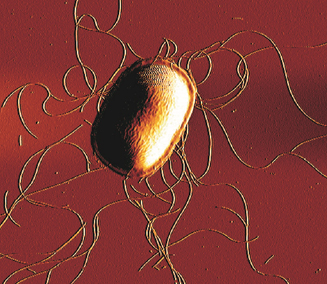The PhD defence will be fully digital and streamed directly using Zoom. The host of the session will moderate the technicalities while the chair of the defence will moderate the disputation.
Ex auditorio questions: the chair of the defence will invite the audience to ask ex auditorio questions either written or oral. This can be requested by clicking 'Participants -> Raise hand'.
Trial lecture
Secondary messengers in bacterial gene regulation
Main research findings
The bacterium Bacillus cereus is increasingly recognized as a major source of food-borne disease, as well as other severe and fatal infections. Biofilms are a common multicellular way of growth, where bacteria can be protected against antibiotics and the immune system during infection. This thesis explores molecular mechanisms connecting regulation of biofilm formation, motility, and virulence in B. cereus, which are all important for the bacterium to cause disease.
High levels of the signaling molecule cyclic-di-GMP inside the bacterial cell were related to increased biofilm formation and reduced motility and virulence, producing the first description of a c-di-GMP regulatory network in B. cereus group bacteria. The protein CdgL, which had a tentative domain for c-di-GMP synthesis, was found to be essential for the cells to produce a flagellum rotor structure and perform swimming motility. Moreover, the DNA-binding regulator protein MogR was found to directly repress the activity of motility genes in B. cereus and to also affect the activity of genes related to virulence and biofilm formation, either directly or indirectly. Taken together, this study further expands the knowledge of how bacteria coordinate their regulation of cellular movement, biofilm formation, and virulence, the degree to which they cause disease.

Read more
Molekylet som styrer det meste bakterien driv med (Titan, 5. februar 2021. In Norwegian)
